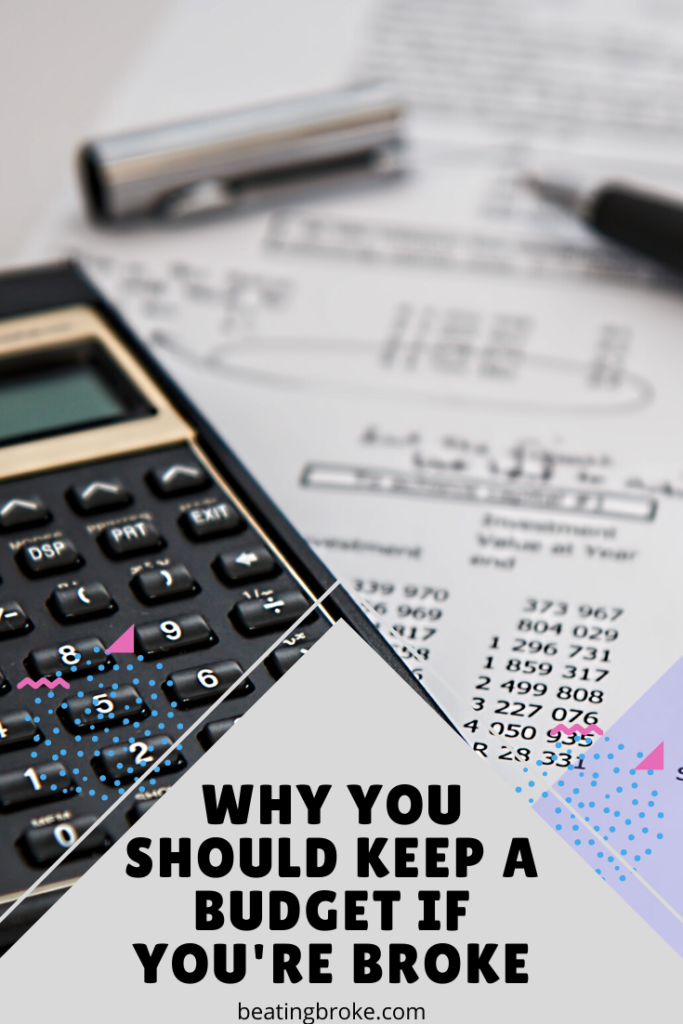When you have plenty of money coming in, budgeting can be easy. You have enough money to pay all of your bills, and you have extra money to put aside for things like a vacation, holiday gifts, etc. My husband and I have been in that position twice during our nineteen-year marriage, and budgeting was fun for me because I could see how we were meeting our goals.
The rest of our marriage, budgeting has been a struggle. When you don’t have enough money coming in to save for anything fun like a night out on the town with your spouse or a yearly vacation, perhaps even not enough money to meet your monthly obligations, budgeting can feel like torture. You may be tempted to join the 59% of Americans who don’t budget (CNN). Yet, this is when you most need to budget.
There are several reasons why you need a budget if you’re broke.

Prioritize Your Obligations
If money is tight, a budget can help you prioritize your obligations. If you don’t have a budget, you may find that you don’t have enough money to pay all your bills, which is never a good position to be in. Without a budget, it’s easier to spend money frivolously because you aren’t as aware of the repercussions. You may even find that you have to take steps to avoid falling into debt and seek legal advice to implement measures such as lowering your child support payments so that you are able to continue to meet compliance with payments. This is important to prioritize for example, as you would want to avoid penalties for non-payment which could result in further financial difficulties.
A Clear Path to Your Goals
Let’s say one of your goals is to save $1,000 in an emergency fund, but money is tight. Maybe you can only put aside $50 a month for that goal. A budget helps you see that if you diligently put away $50 a month, you’ll have your emergency fund in 20 months. Sure, that’s a long time, but you may be able to shorten that time by putting any extra or windfall money into the savings. By doing that, you may be able to establish your $1,000 emergency fund in a year, eight months ahead of schedule.

If you don’t have such a clear handle on your goals, you may instead spend that little bit of money frivolously every month—going out to eat with co-workers or watching a movie with friends instead of saving it. Having a budget can make the path to your goals more concrete.
A Brighter Future
As you can see, just taking the simple steps of meeting your monthly obligations and prioritizing your goals can improve your financial situation. If you make budgeting a habit, little by little, your financial situation will improve. If you manage to put $650 in your emergency fund and then need a $500 car repair, you can pay for it in cash instead of going in debt. Because you were able to stay out of debt, you won’t need to allocate money monthly to a payment and the accompanying interest. Instead, you can work on reestablishing your emergency fund.
When you don’t have much money, the idea of creating a budget may seem intimidating and futile, but that’s ironically when you most need a budget. If you have a clear view of where you are financially and you have a spending plan, you’re much more likely to improve your financial situation over the months and years ahead.
If your money is tight, do you keep a budget or do you prefer to just wing it financially?
Melissa is a writer and virtual assistant. She earned her Master’s from Southern Illinois University, and her Bachelor’s in English from the University of Michigan. When she’s not working, you can find her homeschooling her kids, reading a good book, or cooking. She resides in New York, where she loves the natural beauty of the area.




